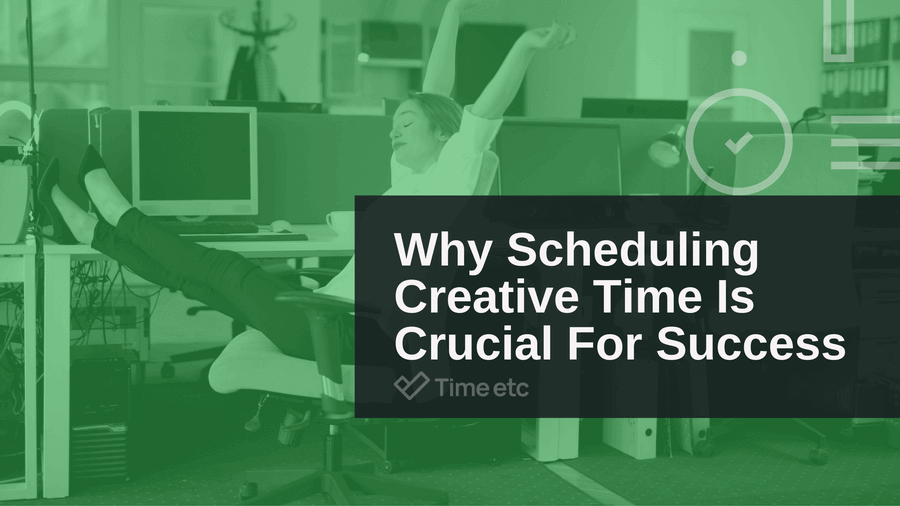Have you ever had days where you feel like you are running on autopilot? Stuck in a seemingly endless cycle of meetings and deadlines?
Are you putting in the hours and crossing tasks off your list, but progress feels a little (or a lot!) slower than it should?
If so, it sounds like an essential element could be falling through the cracks. If you hadn’t already guessed, I’m talking about creativity.
Why you should schedule creative time
Creativity is key in any business, large or small. Without it, you’ll struggle to continually improve and innovate and be competitive in your industry. But, unfortunately, if you’ve been stuck in a creative drought, it’s unlikely that vital inspiration will strike you in the middle of a busy workday when you’re being pulled in multiple different directions. If you’re wondering why, a recent research study found that 72% of us get our most creative ideas in the shower.
Experts believe that the familiarity of the shower routine allows for your mind to truly wander with no distractions, as the shower is perhaps the one and only place where we can’t take our devices.
And according to the study’s leader, cognitive psychologist Scott Barry Kaufman, “The relaxing, solitary, and non-judgmental shower environment may afford creative thinking by allowing the mind to wander freely, causing people to be more open to their inner stream of consciousness and daydreams.”
Of course, trying to install a shower in your office would be highly inconvenient, and spending hours in the shower would be not just impractical, but costly and wasteful. However, we can extract some of the specific shower elements that enable creativity to thrive, and work them into our routines…
Slots for solitude
In today’s ultra-connected world, spending time alone can often be viewed negatively, “that person’s being antisocial”, or “that person must be lonely”. However, as the head of your business, you might find there is much to be gained from time to yourself.
When there are always meetings to attend, deadlines to meet, projects to complete, targets to achieve, and so many other things to think about inside your business, it can be hard to see the bigger picture. Taking time to disconnect yourself from the endless revolving door of work distractions gives you the chance to truly reflect and gain some much-needed perspective. Without it, it’s almost impossible to plan the most effective strategies.
In his bestselling book The E-Myth Revisited, small business coach Michael E. Gerber argues "Your business is nothing more than a distinct reflection of who you are. If your thinking is sloppy, your business will be sloppy. If you are disorganized, your business will be disorganized… If your information about what needs to be done in your business is limited, your business will reflect that limitation. So if your business is to change--as it must continuously to thrive--you must change first."
Just as a bath or shower gives you a rare moment of peace and the chance for your mind to wander freely, you need regular slots in your schedule that will allow you to do the same.
This could be taking a walk during your lunch hour, booking out a meeting room, or a “do not disturb” afternoon in your office. If it feels selfish or indulgent, think of it as a necessary means to an end. In the same way that going to the gym helps people meet their health and fitness goals, these sessions will help you reach your business goals.
Block time for boredom
Hear me out on this one! As a society, we have evolved to avoid boredom at all costs. Advances in technology have meant that at any given moment we have instant access to millions of games, videos, books, music, and social media feeds to occupy our attention, and “ways to cure boredom” has over three million results if you type it into a search engine.
When given the choice between being alone with their thoughts for fifteen minutes or receiving a mild electric shock, participants in a 2014 study preferred the electric shock. But what if boredom is just what we need?
Many renowned creatives have spoken about how boredom was the catalyst that pushed them to pursue their art. Authors Agatha Christie and Neil Gaiman and Turner Prize-winning sculptor Anish Kapoor are just a few examples.
The link between boredom and creativity has fascinated scientists for some time. It's thought that, in a state of boredom, your brain encourages you to find ways to push past this uncomfortable feeling by exploring or discovering new outlets.
In a study from the University of Central Lancashire, in which two sets of participants were asked to come up with as many uses as possible for a pair of plastic cups, the group that was given a boring task beforehand was able to come up with many more inventive uses than the control group.
A subsequent study by the same researchers added a third group with an even more boring task (reading the phone book), and this group significantly outperformed the others. A similar study from Pennsylvania State University found that boredom is more effective at boosting creative thinking than relaxation or happiness.
For years, the “always on”, “always grinding” culture of entrepreneurship would have us believe that our schedules must be packed in order to be productive and succeed, but if you asked some of the world’s most successful business owners, they would disagree.
Back in the 1980s, Microsoft founder Bill Gates began scheduling "think weeks" that he would spend in a secluded cabin in the woods away from life’s distractions. He says those "think weeks" were what led to Internet Explorer launching in 1995.
Virgin founder Richard Branson also champions the benefits of taking time away from your workload, “Open your calendar and schedule time just to dream. Put it in your diary like you would a meeting. Far too many people get weighed down in doing, and never take the time to think and feel. Take five minutes, an hour, a day, or even a holiday. If you free up some time to think freely, you’ll be able to see the bigger picture much easier.”
A last resort
If the thought of doing nothing fills you with pure horror, there are alternatives that can help get your creative juices flowing.
While the key is still to give yourself regular time and space away from your metaphorical desk, you could use these as opportunities to connect with others, if you don’t want to disconnect completely. Networking with others in your field, grabbing a coffee with a fellow entrepreneur, or even checking in with your staff, you never know just what might ignite a spark of inspiration.
What’s the bottom line?
If you are struggling to justify carving out this time in your busy schedule, it’s vital that you see this not as wasted time, but more as an investment into your business. Whether it’s a few hours or even a full day each week, giving yourself this time will pay dividends down the line. When you return, you’ll be refreshed, refocused, and rewarded with enhanced creativity and problem-solving skills.







